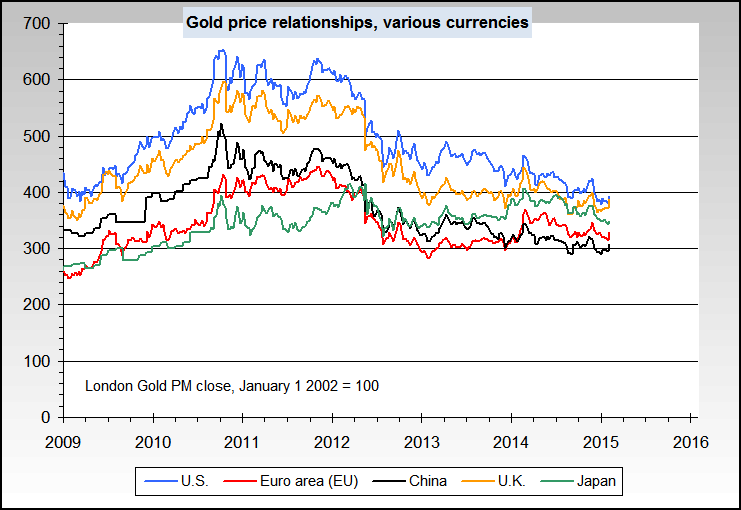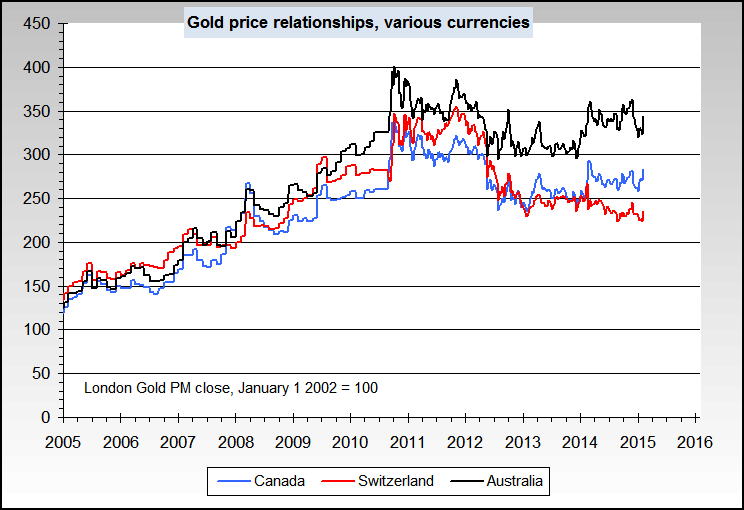Re: Goldman Charts the Currency Wars
Thanks EJ, Polish, and GRG55 for your views on this.
I now better understand the picture of a cooperative, managed depreciation. Thank you!
But I nevertheless wonder what the limits are for any international structure that even purports to act in the best interests of its citizenry. While no nation benefits from actually undergoing a global meltdown, each would surely welcome the opportunity of strain in the system to gain some smaller relative advantage in the process of heading off a meltdown. Unless the system is openly being run for the benefit of a narrow band of bankers, there must be at least a nod to the international aspirations and world-views of the nations participating in the fix.
If one were to peer into the head of central banker, for example, one might find a priority structure something like this:
1. Avert a global financial catastrophe
2. Seek advantage over specific rivals who may be particularly threatening (e.g. China vs. US rivalry)
3. Seek advantage over other nations generally, to be exploited when the current crisis mode fades
4. Seek leverage for those nations philosophically similar to oneself, who may prove friendly after the current crisis
5. Make sure that my friends at Goldman Sachs win no matter how things shake out (I've got a job lined up there when this is over!)
The detailed ranking of any of these is of course debatable.
Even if everyone at the table genuinely wants (1) as their first priority, there is nothing that precludes a friendly rivalry, or "soft currency war," concerning slanting the details of implementation based on 2-5. But unless central bankers are willing to come out and say that 1 and 5 are all that matter, their home countries will be asking some pointed questions about what they are doing regarding 2-4, if only in private. And if they respond by insisting that (1) is their only concern, they could well get more questions about (5) than they'd like.
So what are the limits to such friendliness? Is the very thought of a pre-Bretton-Woods era race-to-the-bottom so anathema that no nation would dare to exploit the current circumstances for individual or national gain? Are central bankers really "apolitical" in spite of Nixon's gaffe? Or are the specific responses to particular crises being carefully selected, with tacitly understood winners and losers being chosen each time along with them? And if the latter, doesn't this lead to a possibility that a key player will simply stop cooperating (though not publicly)?
But who is to say that China, for example, isn't "cheating" by printing a little extra? Didn't OPEC have issues with its cartel in a similar manner?
You make a very compelling, even incontrovertible, case that this is what has happened, and is still happening. And I'm certainly bang alongside you when you suggest that it will continue to happen this way. My question runs more along the lines of: "Until when?" Do you believe that the process of setting up a new monetary system is "manageable" in this way, come what may? Or do you believe that there may be a limit to the ability of central bankers to keep a lid on things?
As GRG55 summarizes nicely:
I tend to fall with him in the third category, but I go further when I assert that central bankers are not only human captives, but conflicted captives of The System, with more than one agenda. And for that reason, I wonder if their conflicts of interest could alter the balance of the whole depreciation process. Could it be compromised, and wrestled into a process more focused, for example, on dollar-decommissioning, than it otherwise would be?
Thanks EJ, Polish, and GRG55 for your views on this.
Originally posted by EJ
View Post
But I nevertheless wonder what the limits are for any international structure that even purports to act in the best interests of its citizenry. While no nation benefits from actually undergoing a global meltdown, each would surely welcome the opportunity of strain in the system to gain some smaller relative advantage in the process of heading off a meltdown. Unless the system is openly being run for the benefit of a narrow band of bankers, there must be at least a nod to the international aspirations and world-views of the nations participating in the fix.
If one were to peer into the head of central banker, for example, one might find a priority structure something like this:
1. Avert a global financial catastrophe
2. Seek advantage over specific rivals who may be particularly threatening (e.g. China vs. US rivalry)
3. Seek advantage over other nations generally, to be exploited when the current crisis mode fades
4. Seek leverage for those nations philosophically similar to oneself, who may prove friendly after the current crisis
5. Make sure that my friends at Goldman Sachs win no matter how things shake out (I've got a job lined up there when this is over!)
The detailed ranking of any of these is of course debatable.
Even if everyone at the table genuinely wants (1) as their first priority, there is nothing that precludes a friendly rivalry, or "soft currency war," concerning slanting the details of implementation based on 2-5. But unless central bankers are willing to come out and say that 1 and 5 are all that matter, their home countries will be asking some pointed questions about what they are doing regarding 2-4, if only in private. And if they respond by insisting that (1) is their only concern, they could well get more questions about (5) than they'd like.
So what are the limits to such friendliness? Is the very thought of a pre-Bretton-Woods era race-to-the-bottom so anathema that no nation would dare to exploit the current circumstances for individual or national gain? Are central bankers really "apolitical" in spite of Nixon's gaffe? Or are the specific responses to particular crises being carefully selected, with tacitly understood winners and losers being chosen each time along with them? And if the latter, doesn't this lead to a possibility that a key player will simply stop cooperating (though not publicly)?
Originally posted by Polish_Silver
View Post
Originally posted by EJ
View Post
As GRG55 summarizes nicely:
Originally posted by GRG55
View Post
.jpg)



Comment